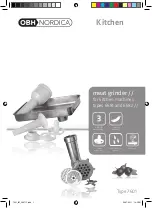
www.avsl.com
350.295UK User Manual
Wireless Waterproof Doorbell
with Portable Chime
Order ref: 350.295UK
User Manual
An understated, battery powered doorbell and portable chime with up to 50m wireless range. The IP54-rated waterproof
push button simply installs against a door frame using the self-tapping screws provided.
House numbers and names can be displayed on the removable name card, protected beneath a clear plastic cover. A
simple ‘ding dong’ melody alerts users to visitors via a compact, lightweight chime that can be moved as req
uired within a
50m operating range of the push button; ideal for large buildings and people with impaired hearing.
Specification:
Frequency
433.92MHz
Range
Up to 50m
Volume
65dB
IP Rating
IP54 (transmitter only)
Battery: Chime
2 x AA (not supplied)
Battery: Remote
1 x CR2032 (supplied)
Dimensions: Chime
120 x 46 x 24mm
Dimensions: Remote
94 x 36 x 18mm
Weight: Chime
60g
Weight: Remote
38g
Features:
•
Easy to install; no wiring required
•
Battery operated with low power consumption
•
Simple
‘ding dong’
melody
•
Wireless range up to 50m
•
Waterproof IP54-rated push button with name
card
In the box:
•
Waterproof push button
•
Portable door chime
•
Fixing kit
•
User guide
Installation:
1.
Install 2 x AA batteries in the chime unit before use, observing the polarity indicators within the battery
compartment.
2.
Place the chime unit in a dry area, away from sunlight and other wireless devices that could affect the signal.
Alternatively, fix the unit to a wall using a self-tapping screw, aligned with the keyhole slot to its rear.
3.
To achieve the maximum wireless range, ensure the clearest line of sight between the push button and chime units.
The signal is weakened by walls and floors, etc.
4.
Replace the batteries whenever the LED indicator on the doorbell becomes dim or the volume of the chime
diminishes.
5.
To replace the batteries in the push button unit, remove the transparent name card cover and name card to reveal
a small self-tapping screw. Carefully undo and remove the screw with a small Philips screwdriver. Then, using a
small slotted screwdriver, apply pressure to the clip located at the bottom of the unit (see diagram below). This will
separate the back panel, enabling access to the battery compartment.
6.
Insert the CR2032 battery and replace the back panel, remembering to replace the self-tapping screw on the front
of the transmitter.




















